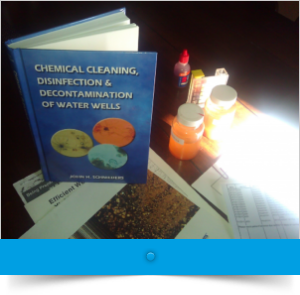Who We Are and What We Do

Water Systems Engineering, Inc. is an independent consulting firm offering specialized diagnostic laboratory services and interdisciplinary consulting staff. Since 1976, WSE has provided innovative and cost-effective solutions in water resource management including potable, industrial, and environmental water systems.
Combining specialized laboratory methods with an experienced consulting team, WSE provides its clients careful consideration and understanding of their water problems. With this approach, WSE provides reliable and innovative solutions for biofouling, declining well yield, reduced pipeline efficiency, aggressive corrosion, and other problems related to wells, water treatment systems, and industrial heating and cooling applications.
WSE’s effective and reliable technical solutions have aided municipalities and corporations alike in improving water quality, management, and system efficiency. Our expertise in well-fouling and maintenance is recognized and sought after across the United States and worldwide.
As recognized professionals in the water industry, our staff works with various state and national associations in the continuing education of professionals in the water industry. Although qualified to speak on a number of related topics, we are often called upon to provide our unique insight into the fouling and remediation of potable water wells.
As part of our commitment to our customers and the industry, WSE’s staff has written numerous articles concerning phenomena we’ve encountered, treatment issues, and maintenance practices and recommendations. Several recent articles are accessible through our website below, and you can contact our office for a more detailed listing and pdf copies.
Services Overview
Research into the problems impacting groundwater systems, potable water treatment, and industrial water handling continues daily at WSE. Our consulting staff actively participates in local, state, and national forums for the industry, developing new standards, innovative approaches, and testing new theories to identify problems early and develop operational procedures and system designs to reduce maintenance costs, downtime, and failure.
Our in-house laboratory utilizes standard methods for the investigation of water while employing new technology for the identification and assessment of biological conditions.
Whether it is identifying sediments present downhole, scale build-up on heat exchangers, or bacteria impacting water quality, WSE’s lab can provide unique insight into these fouling mechanisms.
We are a unique consulting firm and investigative laboratory which specializes in ground water and surface water applications, industrial heating, cooling and water handling systems, and corrosion analysis and control. Our areas of expertise include profiling water from a biological and chemical standpoint, interpreting and evaluating the results and developing protocol for disinfection, rehabilitation and maintenance, as well as system design.
Featured Articles
Well Replacement Decisions parts 1 & 2
Wells foul, age, and degrade for a number of reasons. With increased limitations placed on new wells, higher energy costs for the operation of existing wells, and ever-increasing regulatory oversight, well owners are demanding more from their well systems. Each well is unique and as such, is a reflection of the sum of its components, the setting, and the way it has been maintained. While certain things can be used to extend the longevity of the “system” – there are many issues that can impact the well’s lifespan. We’ll be looking at good degradation and some of the factors that come to bear on the decision of good replacement. Well, failure comes down to an issue of production, of produced water quality, quality of construction, and those areas outside of our control (aka Murphy’s and an affinity for bad luck).
Although numerous tests are available for analyzing bacteria, they vary greatly in the price and time involved. The best approach is one that accounts for the greatest number of bacteria in an acceptable time frame at a reasonable cost.
Benefits of Keeping A Well Active
Wells foul, age, and degrade for a number of reasons. With increased limitations placed on new wells, higher energy costs for operation of existing wells, and ever increasing regulatory oversight, well owners are demanding more from their well systems. Each well is unique and as such, is a reflection of the sum of its components, the setting, and the way it has been maintained. While certain things can be used to extend the longevity of the “system” – there are many issues that can impact the well’s lifespan. We’ll be looking at well degradation and some of the factors that come to bare on the decision of well replacement. Well failure comes down to an issue of production, of produced water quality, quality of construction, and those areas outside of our control (aka Murphy’s and an affinity for bad luck).
